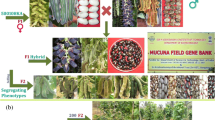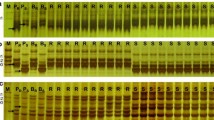Abstract
Manganese deficiency is a major constraint on alkaline soil, particularly for durum wheat, which is more intolerant than either bread wheat or barley. Genetic variation exists in current germplasm of durum wheat. In addition the development of a consistent selection criterion and the recent information on the most probable model for genetic control of Mn efficiency (two genes with additive effect) has made breeding for Mn efficiency feasible. The development of a precise and accurate screening technique will accelerate the breeding and also the genetic study of Mn efficiency. This technique preferably should be accurate, fast, less tedious and supplement the current pot bioassay. Marker assisted selection (MAS) is probably the most commonly claimed application of molecular markers in plant breeding. To identify markers linked to a locus conferring Mn efficiency in durum wheat Amplified Fragment Length Polymorphism (AFLP) analysis was combined with a Bulked Segregant Analysis (BSA) in order to increase the efficiency of identifying of markers linked to loci of interest. A total of 64 primer combinations was used to compare the bulk samples with the two parents in an F2 population of a cross of Mn-efficient (Stjocri 2) x Mn-inefficient (Hazar) durum wheat. Two Primers (Pstl+ACA/Msel+CAA) and (Pstl+ACC/MSEl+CAG) each revealed one AFLP, where the band was present in the efficient bulk and efficient parent but absent in the inefficient bulk and inefficient parent. The AFLPs identified will be tested for cosegregation of the trait by progeny testing the entire F2 population. If linkage to one or two Mn efficiency loci is confirmed, these markers will provide a valuable selection tool for efficient progeny in further segregating populations bred from the same efficient progenitor.
Access this chapter
Tax calculation will be finalised at checkout
Purchases are for personal use only
Preview
Unable to display preview. Download preview PDF.
Similar content being viewed by others
References
Cerverâ, M. T., Gusmao, J., Steenackers, M., Peleman, J., Storme, V., Vanden Broeck, A., Van Montagu, M., and Boerjan, W. (1996) Identification of AFLP molecular markers for resistance against Melampsora larici-populina in Populus. Theor Appl gent 93, 733–737.
Graham, M. J., Nickell, C. D., and Hoeft, R. G. (1995) Inheritance of tolerance to manganese deficiency in soybean. Crop Sci. 35, 1007–1010.
Graham, R. D. (1988) Genotypic differences in tolerance to manganese deficiency. In Manganese in soils and plants (Edited by R. D. Graham, R J Hannam, N. c. Uren ), pp. 261–276. Kluwer Academic Publishers, Dordrecht, The Netherlands.
Huang, C., Webb, M. J., and Graham, R. D. (1994) Manganese efficiency is expressed in barley growing in soil system but not in solution culture. J Plant Nutr 17, 83–95.
Khabaz Saberi, H., Graham, R. D., and Rathjen, A. J. (1997) Genotypic variation for manganese efficiency in durum wheat (Triticum turgidum L. var. durum). In (T. Ando, K. Fujita, T. Mae, H. Matsumoto, S. Mori, & J. Sekiya), Kluwer Academic Publishers. Tokyo, Japan. 33–35.
Khabaz Saberi, H., Graham, R. D., and Rathjen, A. J. (1998) Inheritance of Mn efficiency in durum wheat (Triticum turgidum L. var. durum). J Plant Nutr in press,
Langridge P. (1994) Molecular markers in wheat breeding and research. In 7th Assembly Wheat Breeding Society of Australia (Edited by J. G. Paull, I. S. Dundas, & K. W. Shepherd)The University of Adelaide, Adelaide.
Langridge, p., Karakousis, A., and Nield, J. (1996) Course Manual of Practical Workshop in Basic Recombinant DNA Techniques Application to Plant Breeding. Centre for Cereal Biotechnology, Waite Agriculture Research Institute, The University of Adelaide, Adelaide, SA.
Michelmore, R. W., Paran, I., and Kesseli, R. V. (1991) Identification of markers linked to disease-resistance genes by bulked segregant analysis: a rapid method to detect markers in specific genomic regions by using segregating populations. Proc Nati Acad Sci USA 88, 98289832.
Robson, A. D., and Snowball, K. (1986) Nutrient deficiency and toxicity symptoms. In Plant analysis-An interpretation manual (Edited by D. J. Reuter, J. B. Robinson ), pp. 13–19. Inkata press, Melborne.
Vos, P., Hogers, R., Bleeker, M., Reijans, M., Lee, T. V. D., Hornes, M., Frijters, A., Pot, J., Peleman, J., Kuiper, M., and Zabeau, M. (1995) AFLP: A new technique for DNA fingerprinting. Nucleic Acids Res 23, 4407–4414.
Author information
Authors and Affiliations
Editor information
Editors and Affiliations
Rights and permissions
Copyright information
© 1999 Springer Science+Business Media Dordrecht
About this paper
Cite this paper
Khabaz-Saberi, H., Barker, S.J., Graham, R.D., Rathjen, A.J. (1999). The Application of Amplified Fragment Length Polymorphism (AFLP) for Breeding MN Efficiency in Durum Wheat (Triticum Turgidum L. Var. Durum). In: Gissel-Nielsen, G., Jensen, A. (eds) Plant Nutrition — Molecular Biology and Genetics. Springer, Dordrecht. https://doi.org/10.1007/978-94-017-2685-6_48
Download citation
DOI: https://doi.org/10.1007/978-94-017-2685-6_48
Publisher Name: Springer, Dordrecht
Print ISBN: 978-90-481-5225-4
Online ISBN: 978-94-017-2685-6
eBook Packages: Springer Book Archive




